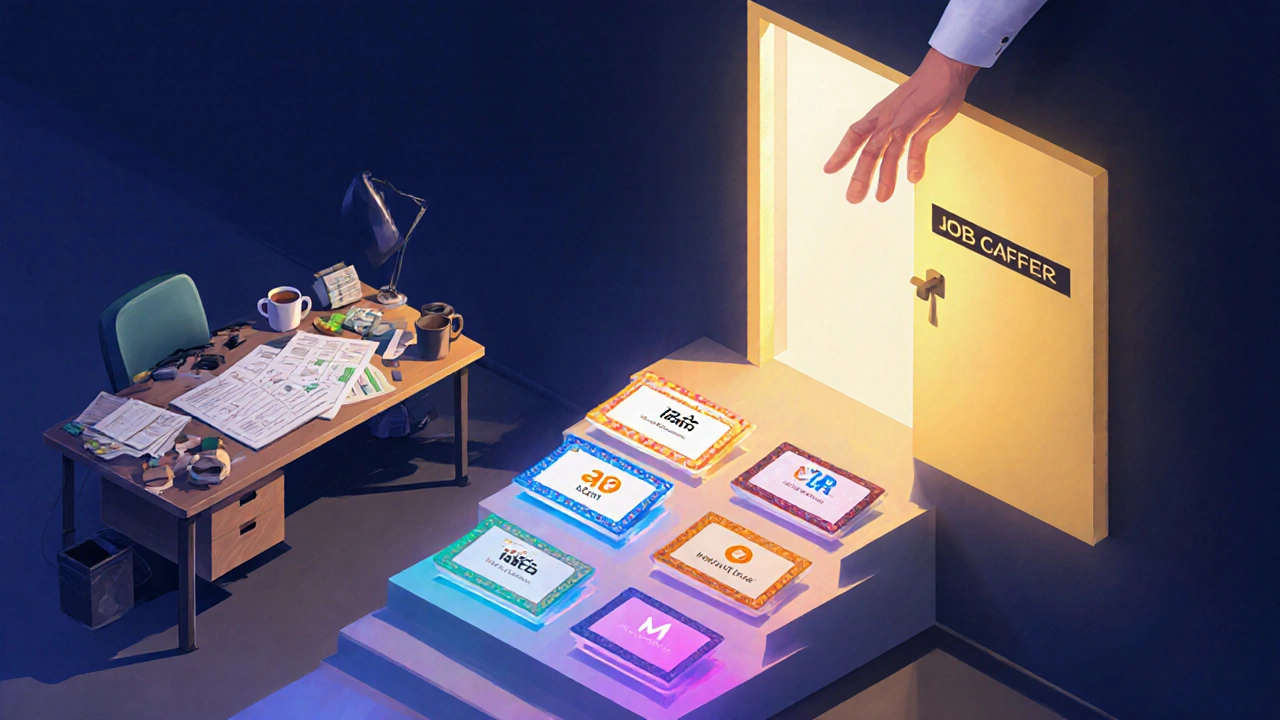Job-Ready Course Finder
If you're looking to land a job quickly, not just any online course will do. You need something that employers actually recognize, that teaches real skills, and that gets you hired within weeks-not months. The truth is, some courses open doors faster than others. And in 2025, the job market isn’t waiting for theory-it’s hiring people who can do the work right now.
What Makes a Course Actually Help You Get Hired?
Not every certificate matters. Companies don’t care if you finished a 40-hour course on ‘Introduction to Marketing.’ They care if you can run a Facebook ad campaign, fix a broken website, or analyze sales data in Excel. The best job-ready courses focus on skills, not just knowledge. They give you hands-on projects you can show in a portfolio, and they often include resume help, interview prep, or even direct job placement.
Look for courses that answer three questions:
- Can I build something real by the end?
- Do companies actually hire people with this certification?
- Is there proof people got jobs after taking it?
If the answer to any of these is ‘no,’ keep looking.
Top 5 Job-Ready Online Courses in 2025
Here are the five courses that consistently lead to jobs-based on hiring data from Australian and global job boards, employer surveys, and graduate outcomes from platforms like Coursera, Google, and LinkedIn Learning.
1. Google Career Certificates: Data Analytics
This is one of the most reliable paths into entry-level tech jobs. The Google Data Analytics Certificate takes about six months part-time. You learn SQL, Tableau, R, and how to clean and visualize real datasets. Over 70% of graduates report getting a job within six months of finishing, according to Google’s 2024 employer survey. Many land roles like Junior Data Analyst, Business Intelligence Associate, or Operations Analyst. Employers in Sydney, Melbourne, and Brisbane actively recruit from this program because it’s built with input from companies like Deloitte, IBM, and KPMG.
2. Meta Certified Social Media Marketing Professional
Every business, from local cafes to multinational brands, needs someone who can run social ads. The Meta certification covers Facebook, Instagram, LinkedIn, and TikTok ad strategies. You’ll create real ad campaigns using Meta’s ad manager, analyze performance metrics, and optimize budgets. The course includes a capstone project you can add to your LinkedIn profile. In 2025, over 68% of Australian small businesses hired someone with this certification within three months of posting a job. It’s not about being a ‘content creator’-it’s about driving sales. That’s what gets you hired.
3. IBM Data Science Professional Certificate (Coursera)
If you’re comfortable with numbers and want to move into tech faster than a degree allows, this is your shortcut. The IBM course teaches Python, machine learning basics, data visualization, and how to use Jupyter Notebooks. Unlike academic programs, this one is built with real-world case studies from healthcare, finance, and retail. Graduates often land roles as Data Analysts or Junior Data Scientists. Many Australian tech startups now list this certificate as a preferred qualification-even over degrees in some cases.
4. AWS Certified Cloud Practitioner
Cloud computing isn’t going away. In fact, 94% of global enterprises use cloud services, and Australia is one of the fastest-growing markets. The AWS Cloud Practitioner exam is the easiest entry point into cloud careers. The course takes 4-6 weeks to complete, costs under $100 AUD, and teaches you how cloud infrastructure works, security basics, and cost management. Companies like Atlassian, Canva, and Telstra hire for cloud support roles-and they often accept this certificate as proof of foundational knowledge. You don’t need to be an engineer to start here. Many people begin as Cloud Support Associates and move up from there.
5. Microsoft Certified: Power Platform Fundamentals
Businesses are drowning in spreadsheets and manual workflows. The Power Platform (Power BI, Power Apps, Power Automate) lets non-developers build apps and automate tasks without writing code. This certification shows you can create dashboards, connect data sources, and build simple apps that save companies hours every week. In 2025, over 40% of mid-sized Australian firms hired someone with this certification to replace outsourced IT work. It’s especially valuable in finance, logistics, and government sectors. You can learn it in under 30 hours and start applying right away.
What to Avoid
Not all ‘job-ready’ courses are created equal. Stay away from these red flags:
- Courses that promise ‘guaranteed jobs’-no legitimate course can guarantee employment.
- Programs that only give a PDF certificate with no portfolio or project work.
- Overpriced courses on Udemy with no employer recognition (unless they’re from well-known instructors with verifiable student outcomes).
- Generic ‘career coaching’ packages that bundle five unrelated courses together.
The best courses don’t just teach-they prepare you to prove you can do the job.
How to Pick the Right One for You
Ask yourself these questions before signing up:
- What kind of work do you actually enjoy? (Data? Design? Writing? Fixing tech?)
- How much time can you commit per week? (2 hours? 10 hours?)
- Do you prefer learning with videos, live projects, or interactive labs?
- Can you build something to show employers by the end?
If you like working with numbers → go for Data Analytics or Power Platform.
If you like being creative and talking to people → Social Media Marketing.
If you’re drawn to tech but don’t want to code → Cloud Practitioner.
Don’t choose based on what’s trending. Choose based on what you’ll actually do every day.
What Happens After You Finish?
Finishing the course is only half the battle. Here’s what to do next:
- Build a simple portfolio website (use free tools like Notion, Canva, or GitHub Pages).
- Add your project from the course-show the problem, your solution, and the result.
- Update your LinkedIn headline: ‘Junior Data Analyst | Google Data Analytics Certified’.
- Apply to 5 jobs a week-even if you think you’re ‘not qualified.’
- Join local tech meetups or LinkedIn groups in your city. Networking gets you noticed.
People don’t hire resumes. They hire proof you can do the work.

Real Stories, Real Results
One woman in Perth, 42, was working in retail. She took the Google Data Analytics course in her spare time. Three months later, she got hired as a Junior Analyst at a health startup. Her salary went from $48,000 to $72,000.
A man in Adelaide, 28, had no tech background. He finished the Meta Social Media Marketing cert in six weeks. He started freelancing on Upwork, then got a full-time role at a digital agency. He now earns $65,000 a year.
These aren’t outliers. They’re people who chose the right course, did the work, and showed up.
Final Tip: Start Small, Prove It Fast
You don’t need to master everything. Pick one course. Finish it. Build one project. Apply to ten jobs. Get feedback. Adjust. Repeat.
The fastest way to a job isn’t studying longer. It’s doing something tangible-and showing it to the people who hire.
Are free online courses worth it for getting a job?
Some are, but only if they include hands-on projects and recognized certification. Free courses on YouTube or Coursera’s audit mode won’t help you get hired unless you pay for the verified certificate and complete the capstone project. Employers look for proof you finished the full program-not just watched videos.
How long does it take to get a job after finishing a course?
Most people land their first job within 1 to 4 months after finishing a job-ready course, if they apply consistently. The fastest results come from people who start applying during the course, not after. Building a portfolio and networking early cuts the timeline in half.
Do I need a degree to get hired after taking an online course?
No. Many Australian employers now prioritize skills over degrees-especially in tech, marketing, and data roles. Certifications from Google, IBM, AWS, and Meta are listed as preferred or required qualifications in over 60% of entry-level job postings in those fields. Your portfolio and project work matter more than your transcript.
Which course has the highest job placement rate?
As of 2025, the Google Career Certificate in Data Analytics has the highest verified job placement rate at 72% within six months. The Meta Social Media Marketing certificate follows closely at 68%. Both have strong employer partnerships and real-world project requirements that make candidates stand out.
Can I take these courses if I’m not from Australia?
Yes. All the courses mentioned are available globally and taught in English. The skills are universal. Many international students in Australia take these courses to qualify for local jobs. Employers care about your ability to do the work, not your passport.

